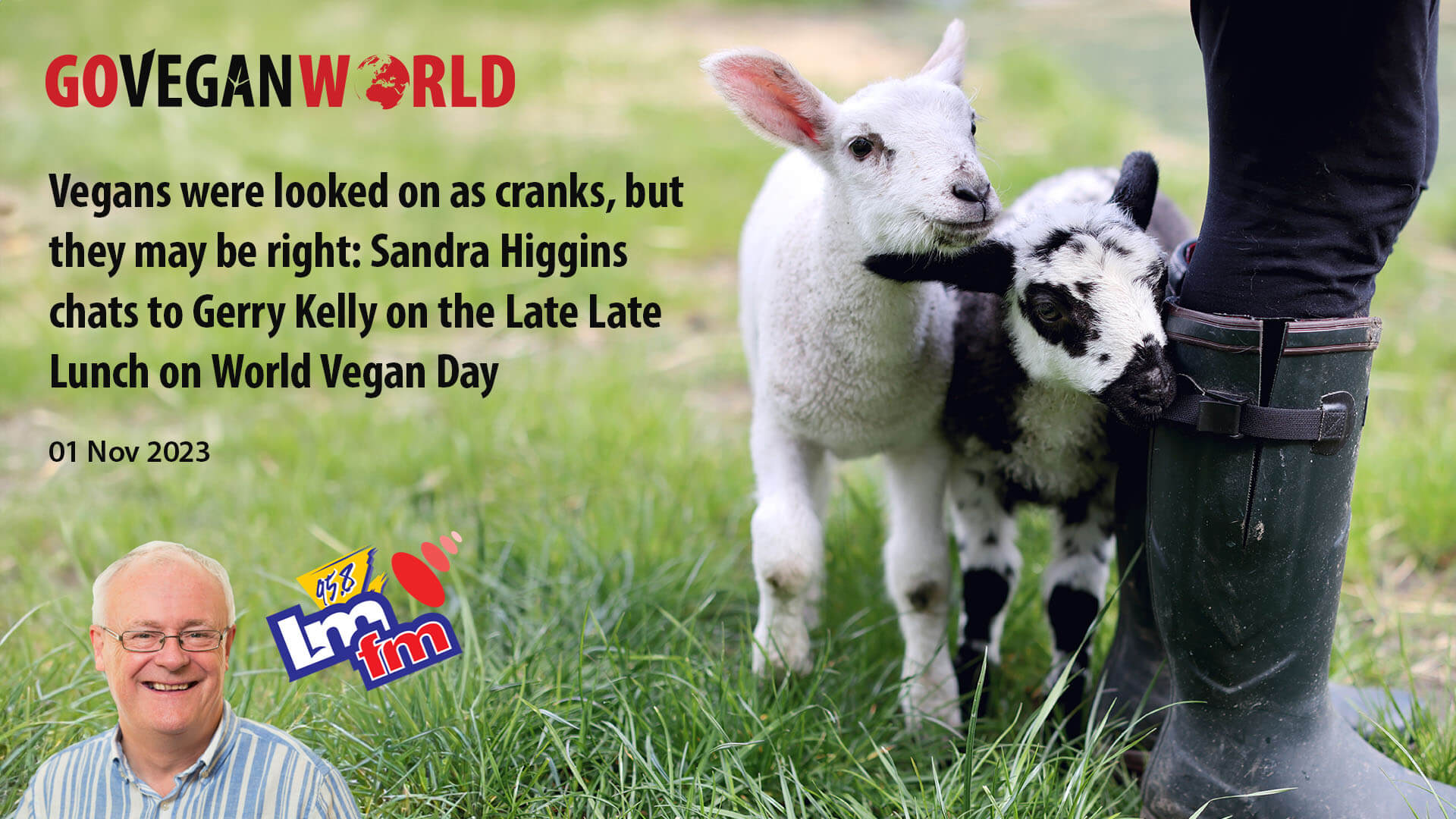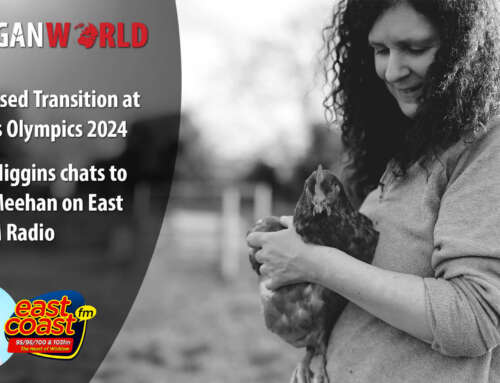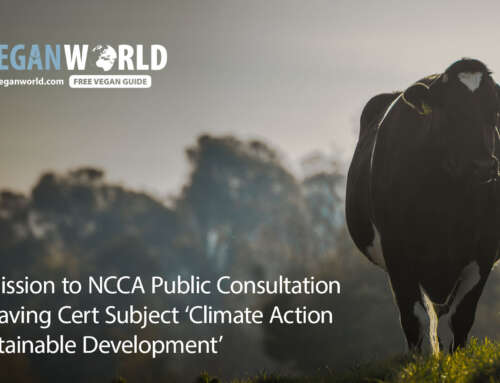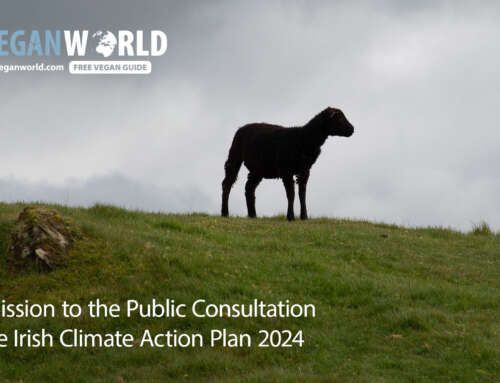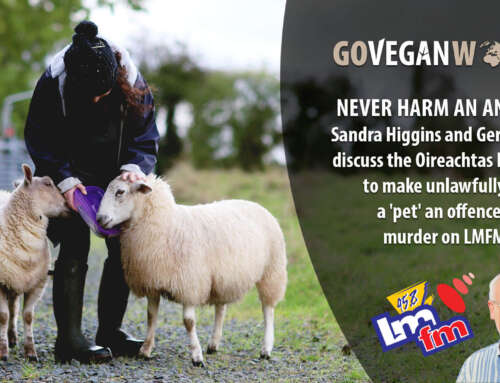Vegans were looked on as cranks, but they may be right: Sandra Higgins chats to Gerry Kelly on the Late Late Lunch on World Vegan Day
In celebration of World Vegan Day, Sandra Higgins was a guest on The Late Late Lunch with Gerry Kelly of LMFM.
As we chatted, the news bulletins are covering severe flooding in several counties in Ireland. The streets are running like rivers, homes and businesses are being destroyed and further heavy rain is forecast. Is there a link between climate change and animal agriculture?
Our Diet, Climate Change and Environmental Destruction
The latest EPA figures from Ireland show that emissions from agriculture are 38.4% of total Irish emissions, most of that coming from animal agriculture. Global emissions from the food sector are between one quarter and one third of total emissions, most of that also attributable to animal farming.
Recent research shows that vegan diets resulted in 75% less climate-heating emissions, water pollution and land use than diets in which more than 100g of meat a day was eaten. Vegan diets also cut the destruction of wildlife by 66% and water use by 54%, the study found 1 .
Being vegan and eating a plant diet is the most effective way individuals can reduce their environmental footprint without depending on institutional change.
It is understandable that farmers believe they are being targeted and fear for their livelihoods. For too long they have lived in a fantasy world where farming bodies falsely assured them that Ireland could feed the world. The truth is that animal agriculture is a broken system that is only functioning because of subsidies. To address environmental destruction and climate change, every effort should be made to encourage consumers to abolish animal products from their shopping trolleys and replace them with plant products. If consumers do not create a demand for them, farmers will stop producing them. There should be a shift in subsidies from animal agriculture to animal-free, ethical, sustainable and environmentally friendly farming. Farmers need government support to learn the skills to adopt a new way of working that does not involve other animals. If we don’t change now, we will not have a planet that can produce food and their children’s children will not be able to farm anything.
What about the nutritional aspects of a plant-based diet?
Sandra pointed out that a lot of the concern about plant diets reaches the public through the media which is frequently a mouthpiece for the animal agriculture industry. The industry has a vested interest in maintaining public consumption of animal products. That is why they plant seeds of doubt about the nutritional adequacy of a plant diet.
Most people in Ireland are not vegan. Yet, there are significant concerns about specific nutrient intake in the general, non-vegan population. This doesn’t get the bad press that plant diets get.
A study published in the British Journal of Nutrition found 1 in 8 adults (in the general population) are deficient in B12, a very important nutrient that can cause irreversible harm to our health 2 . The risk of B12 deficiency increases as we age so it is vital to ensure sufficient intake. Vegans can get B12 by eating fortified food or taking a supplement. Most vegans are very well versed in the importance of this vitamin.
B12 is not the only nutrient the general Irish population is deficient in. A study published in the European Journal of Nutrition found that in a sample of Irish teenagers 94% were deficient in intakes of Vitamin D and 67% deficient in intakes of calcium 3 . Again, this study was not conducted on a vegan population.
It is recommended that everyone in Ireland take a Vitamin D supplement because we are a Northerly country without sufficient sunlight. Vitamin D is also vital for bone health.
Calcium is a very important mineral for bone health. It is only when teenagers are older that the effects of bone mineral density loss become apparent when bones fracture easily. Adequate intake of calcium, vitamin D and a healthy lifestyle are the best ways of preventing osteoporosis. It is easy to incorporate adequate levels of these nutrients on a plant diet.
A plant-based diet is associated with a lower risk of health issues such as hypertension, high cholesterol, Type II diabetes, and some cancers. You can get all the nutrients you need for health on a plant diet. Check out these helpful sites for yourself.
https://plantbasedhealthprofessionals.com/
https://www.vegansociety.com/go-vegan/how-go-vegan/meal-planning
https://www.bda.uk.com/resource/vegan-diet-healthier-way.html
https://www.indi.ie/women-s-health/1678-new-plant-based-diet-sheets.html
How Has Veganism Progressed in Recent Years?
There have been many wins for the animal rights movement and veganism in recent years. Veganism is now a household word. But the fact remains that every year more animals are bred and killed than in previous years. The animal rights movement faces an uphill battle against then power and machinations of the animal using industries that seek to keep the general population ignorant of the urgent need for veganism 4 , 5 . We need an extraordinary change in human thinking and behaviour to effect the kind of change that will make a difference to other animals and to the negative effect that using them is having on our environment and weather systems, as well as intersectional human health and human rights violations in those industries.
It is the moral obligation of everyone not to use feeling animals as if they were objects or resources. It is everyone’s responsibility to have access to vegan and animal rights information. It is the responsibility of each of us to live vegan. As Gerry notes at the end of the interview, there was a time when vegans were viewed as cranks, but it is becoming increasingly clear that our rationale is cogent.
1 Scarborough, P., Clark, M., Cobiac, L. et al. Vegans, vegetarians, fish-eaters and meat-eaters in the UK show discrepant environmental impacts. Nat Food 4, 565–574 (2023).
2 Laird, E., O’Halloran, A., Carey, D., O’Connor, D., Kenny, R., & Molloy, A. (2018). Voluntary fortification is ineffective to maintain the vitamin B12 and folate status of older Irish adults: Evidence from the Irish Longitudinal Study on Ageing (TILDA). British Journal of Nutrition, 120(1), 111-120. doi:10.1017/S0007114518001356
3 Cashman KD, Kehoe L, Kearney J, McNulty B, Walton J, Flynn A. Adequacy of calcium and vitamin D nutritional status in a nationally representative sample of Irish teenagers aged 13-18 years. Eur J Nutr. 2022 Dec;61(8):4001-4014. doi: 10.1007/s00394-022-02939-3. Epub 2022 Jul 3. PMID: 35780425; PMCID: PMC9598778.
4 Vallone S and Lambin EF, (2023) Public policies and vested interests preserve the animal farming status quo at the expense of animal product analogs, One Earth, Volume 6, Issue 9.
5 https://www.theguardian.com/environment/2023/oct/27/revealed-industry-figures-declaration-scientists-backing-meat-eating

